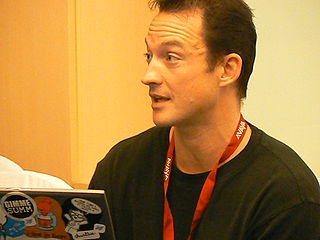Top 1200 Management Systems Quotes & Sayings - Page 5
Explore popular Management Systems quotes.
Last updated on April 20, 2025.
The good news about fresh water is that, even after accounting for the larger volume of water that is unavailable to people from the hydrologic cycle, there is enough on a global scale to support current and anticipated populations on a sustainable basis... Three essential goals are dependable and safe supplies for people, protection and management of the environmental systems through which water moves, and efficient water use. Meeting these goals will require that fresh water not continue to be treated as a free good or as the principal means for disposing of human and industrial wastes.
Nothing in finance is more fatuous and harmful, in our opinion, than the firmly established attitude of common stock investors regarding questions of corporate management. That attitude is summed up in the phrase: "If you don't like the management, sell your stock." ... The public owners seem to have abdicated all claim to control over the paid superintendents of their property.
A lot of the strength of an RPG world lies in its foundation: its systems, lore, and when appropriate, its magic systems. While there are elements tied to 'Project: Eternity' that at first glance seem to be classic fantasy, that's intentional - we do want to recreate some elements of a High Fantasy experience.
I think the Scandinavian health systems are better when it comes to preventative care than the German system, because in the Scandinavian systems, the government is really more active in defining treatment, goals and defining health priorities. The German system is a competitive system with little government intervention. The price for this is that the government cannot set a health agenda. And the Scandinavian systems have little competition, so you often do have waiting lists. But on the other hand, you then have the government which can push for prevention.
I put that in my management's hands and my company's hands. We sit down all together, the family, D-Block, my management and I go build with KOCH, the distributor. You open up your own sites, you get your MySpace, you get your websites and get your little digital team on the side... and that's how you handle that.
"Oppression" or "systems of oppression" operate as a shorthand terms in much writing and speaking so that we do not have to list all these systems of meaning and control each time (i.e. racism, ableism, xenophobia, etc.). I needed a term like that, but "oppression" implies a kind of top-down understanding of power that is at odds with the Foucaultian model I rely on in my work.
I think we're already getting to a stage where the basic artificial intelligences are discovering moral systems. I think, in many ways, moral systems are simply things that we have programmed into ourselves, either through childhood or just through genetic, ingrained ideas. So the same thing applies when you talk about machines.
Every one of you sitting here today is carrying at least 500 measurable chemicals in your body that were never in anybody's body before the 1920s... We have dusted the globe with man-made chemicals that can undermine the development of the brain and behavior, and the endocrine, immune and reproductive systems, vital systems that assure perpetuity... Everyone is exposed.
Wherever we find orderly, stable systems in Nature, we find that they are hierarchically structured, for the simple reason that without such structuring of complex systems into sub-assemblies, there could be no order and stability- except the order of a dead universe filled with a uniformly distributed gas.
A lot of the so-called systems composers have this thing that the system is always right. You don't fiddle with it at all. Well, I don't think that. I think the system is as right as you judge it to be. If for some reason you don't like a bit of it you must trust your intuition on that. I don't take a doctrinaire approach to systems.
I think that the best training a top manager can be engaged in is management by example. I want to make sure there is no discrepancy between what we say and what we do. If you preach accountability and then promote somebody with bad results, it doesn't work. I personally believe the best training is management by example. Don't believe what I say. Believe what I do.
What I find in a creative company is while there is a desire to build a management foundation that can feel clear and consistent, the unique product we're in Illumination Entertainment making doesn't always allow for that. So rather than following management strategy that talks about building your structure and then staffing that structure, I tend to build the structure around the strengths of the individual people we have.
Many mammals and birds have systems for strong self-control, and it is not difficult to see why such systems were advantageous and were selected for. Biding your time, deferring gratification, staying still, foregoing sex for safety, and so forth, is essential in getting food, in surviving, and in successful reproduction.
The reductionist measure of yield is to agriculture systems, what GDP is to economic systems. It is time to move from measuring yield of commodities, to health and well-being of ecosystems and communities. Industrial agriculture has its roots in war. Ecological agriculture allows us to make peace with the earth, soil and the society.
Companies, as they grow to become multi-billion-dollar entities, somehow lose their vision. They insert lots of layers of middle management between the people running the company and the people doing the work. They no longer have an inherent feel or a passion about the products. The creative people, who are the ones who care passionately, have to persuade five layers of management to do what they know is the right thing to do.
The management of creativity is more intimate. By that I mean that it deals with an individual's personal, psychological landscape. It deals with the way you create relationships. It deals with creating an atmosphere and environment that support the creative process. As a result, it is a management skill set that is inherently psychological and that encourages desired outcomes rather than demands those outcomes.
Empires are synonymous with centralized if occasionally schismatized hierarchical power structures in which influence is restricted to an economically privileged class retaining its advantages through usually a judicious use of oppression and skilled manipulation of both the society's information dissemination systems and its lesser as a rule nominally independent power systems. In short, it's all about dominance.
You want to favor systems that benefit from error, disorder, variability and things like that. You want to favor these systems and unfortunately, when - there's something I call the Soviet Illusion. The more the government becomes intrusive, the more things have to follow a script, and it can't handle this kind of system.
We diversify in two ways. First, we probably trade more markets worldwide than any other money manager. Second, we don't just use a single best system. To provide balance, we use lots of different systems ranging from short to long term. Some of these systems may not be that good by themselves, but we really don't care; that is not what they are there for.
In investment management today, everybody wants not only to win, but to have a yearly outcome path that never diverges very much from a standard path except on the upside. Well, that is a very artificial, crazy construct. That's the equivalent in investment management to the custom of binding the feet of Chinese women
I am certain that Gadi Lesin's abilities and the experience he accumulated during his sixteen years in a variety of general management roles in Strauss Group in and outside of Israel will enable him, together with group management and all managers and employees of Strauss, to continue to take the group forward to further success.
Nature is flexible and resilient. Nature likes redundancy and dispersion. It is approximate and deals in gradients. All boundaries are permeable. Nature nests small systems like molecules within larger systems like cells, which in turn are nested in systems called organs, organisms, ecosystems. We grew from ancient one-celled ancestors. Nature likes mergers: we contain multitudes of other life forms within us. We stand at the crest of four billion years, bacteria molded into wondrous form, burning with a slow fire and about to take the next step.
Until part of your paycheck is regularly paid in Bitcoin, I'm not sure how it would really go mainstream. I can imagine places in the world where there are not functioning banking systems or payroll systems, where it could go mainstream first because you're not trying to replace the way people are already doing something.
Commercial institutions, proud of their achievements, do not see that healthy living systems - clean air and water, healthy soil, stable climates - are integral to a functioning economy. As our living systems deteriorate, traditional forecasting and business economics become the equivalent of house rules on a sinking cruise ship.
When I wrote my first book, Crisis Management: Planning for the Inevitable, it was endorsed by the American Management Association, and consequently was read by America's top corporate leaders, and overnight put me in high demand as a consultant and as a speaker. Also, that book forever changed the way businesses look at and deal with crises by giving a tangible feel to an otherwise intangible subject.
Most of the time, your risk management works. With a systemic event such as the recent shocks following the collapse of Lehman Brothers, obviously the risk-management system of any one bank appears, after the fact, to be incomplete. We ended up where banks couldn't liquidate their risk, and the system tended to freeze up.
It has been the scheme of the Christian Church, and of all the other invented systems of religion, to hold man in ignorance of the Creator, as it is of Government to hold man in ignorance of his rights. The systems of the one are as false as those of the other, and are calculated for mutual support.
The truth us that other systems of geometry are possible, yet after all, these other systems are not spaces but other methods of space measurements. There is one space only, though we may conceive of many different manifolds, which are contrivances or ideal constructions invented for the purpose of determining space.
























































